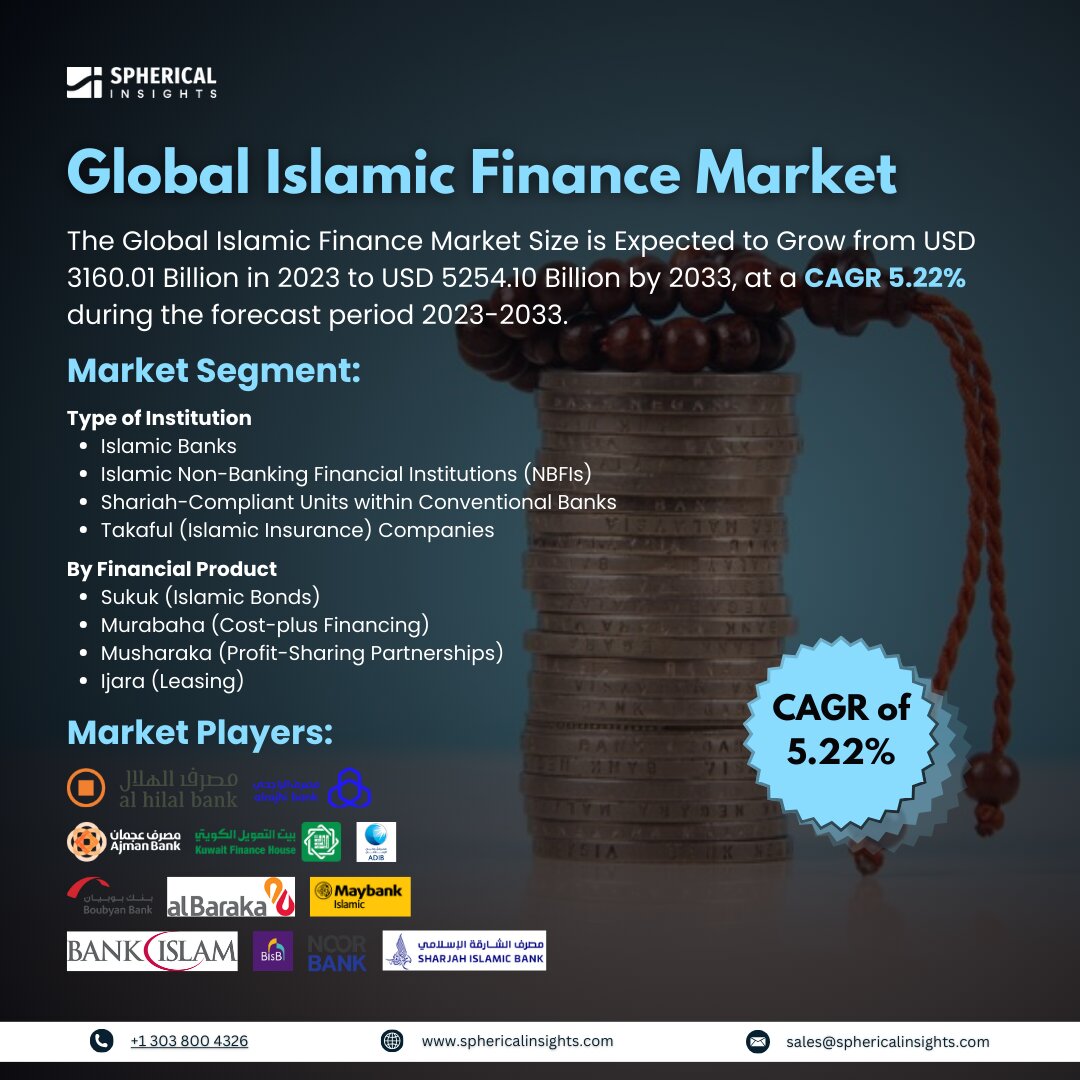Global Islamic Finance Market Size to worth USD 5254.10 Billion by 2033
According to a research report published by Spherical Insights & Consulting, the Global Islamic Finance Market Size is Expected to Grow from USD 3160.01 Billion in 2023 to USD 5254.10 Billion by 2033, at a CAGR 5.22% during the forecast period 2023-2033.
Browse key industry insights spread across 210 pages with 110 Market data tables and figures & charts from the report on the Global Islamic Finance Market Size, Share, and COVID-19 Impact Analysis, By Type of Institution (Islamic Banks, Islamic Non-Banking Financial Institutions (NBFIs), Shariah-Compliant Units within Conventional Banks, and Takaful (Islamic Insurance) Companies), By financial product (Sukuk (Islamic Bonds), Murabaha (Cost-plus Financing), Musharaka (Profit-Sharing Partnerships), and Ijara (Leasing)), and By Region (North America, Europe, Asia-Pacific, Latin America, Middle East, and Africa), Analysis and Forecast 2023 – 2033.
The Islamic finance market is a financial system that adheres to Islamic law, or Shariah, providing services such as banking, investments, and insurance. The primary goals of Islamic finance are to promote economic welfare, social justice, and equitable wealth distribution. This market is influenced by several factors, including the growing Muslim population, which increases the demand for financial services that comply with Islamic principles. Islamic finance emphasizes ethical investment and risk-sharing while avoiding practices such as interest, speculation, and excessive uncertainty. Advancements in digital banking and financial technologies have also made Islamic finance more accessible and convenient for consumers. Furthermore, as investment diversity increases, more institutions are expressing interest in Islamic finance products. However, the Islamic finance market faces certain challenges, including limited product offerings and difficulties related to Sharia compliance. The range of Islamic finance products is restricted by Sharia principles, which prohibit activities like interest and speculative transactions. This limitation can lead to a narrower selection of financial solutions compared to conventional banking products. Additionally, Sharia principles may hinder product innovation and development. Islamic finance also encounters challenges in terms of replicating conventional financial practices, managing profit and loss sharing, preventing fund mingling, ensuring authenticity, and maintaining liquidity.
The shariah-compliant units within the conventional banks segment are predicted to hold the largest market share through the forecast period.
Based on the type of institution, the Islamic finance market is classified into Islamic banks, Islamic non-banking financial institutions (NBFIs), Shariah-compliant units within conventional banks, and takaful (Islamic insurance) companies. Among these, the Shariah-compliant units within the conventional banks segment are predicted to hold the largest market share through the forecast period. The demand for ethical financial products that adhere to Islamic law is increasing. As more consumers and businesses seek financial solutions that align with their religious beliefs, conventional banks are expanding their services to include Shariah-compliant options. This trend is further supported by regulatory backing and a growing awareness of the principles of Islamic finance. It presents a lucrative opportunity for banks to attract a broader customer base while ensuring compliance with Shariah standards.
The sukuk (Islamic bonds) segment is anticipated to hold the highest market share during the projected timeframe.
Based on the financial product, the Islamic finance market is divided into sukuk (Islamic bonds), murabaha (cost-plus financing), musharaka (profit-sharing partnerships), and ijara (Leasing). Among these, the sukuk (Islamic bonds) segment is anticipated to hold the highest market share during the projected timeframe. The rising appetite for investment products that comply with Islamic finance principles is also noteworthy. Sukuk, or Islamic bonds, are gaining popularity among both institutional and retail investors because they provide opportunities to earn returns while adhering to Shariah law. The increasing involvement of governments and corporations in issuing sukuk for financing infrastructure and development projects is bolstering this market segment. Furthermore, the global shift towards sustainable and ethical investing aligns well with the principles of Sukuk, enhancing its appeal in the financial landscape.
North America is estimated to hold the largest share of the Islamic finance market over the forecast period.
North America is estimated to hold the largest share of the Islamic finance market over the forecast period. This growth is largely driven by a burgeoning Muslim population and a growing interest in ethical investment options. Financial institutions in the region are progressively adapting to meet the needs of this demographic by offering a range of Sharia-compliant products and services. The integration of Islamic finance principles into mainstream banking practices is fostering a more inclusive financial environment, attracting both Muslim and non-Muslim investors alike. This combination of demand and innovation positions North America as a key player in the global Islamic finance landscape.
Europe is expected to grow the fastest during the forecast period. The growth of Shariah-compliant financial products is driven by increasing awareness and acceptance among diverse populations. The region features a robust regulatory framework and a proactive approach to incorporating Shariah-compliant finance within its existing financial system, which is facilitating this growth. The rising interest in ethical and sustainable finance options, combined with the growing Muslim population, is further driving demand for Shariah-compliant investments. As European institutions begin to recognize the potential of Islamic finance, the market is anticipated to expand rapidly, making it a significant area of focus for both investors and financial institutions.
Competitive Analysis
Major key players in the Islamic finance market includes Al Hilal Bank, Al Rajhi Bank, Ajman Bank, Kuwait Finance House, Boubyan Bank, Al Baraka Banking Group, Bank Islam Malaysia, Abu Dhabi Islamic Bank, Maybank Islamic, Sharjah Islamic Bank, Bahrain Islamic Bank, Noor Bank, Qatar Islamic Bank, Dubai Islamic Bank, CIMB Islamic, and Others.
Key Target Audience
- Market Players
- Investors
- End-users
- Government Authorities
- Consulting And Research Firm
- Venture capitalists
- Value-Added Resellers (VARs)
Recent Development
- In October 2024, Tuum announced the launch of foundational Islamic banking and finance solutions to provide comprehensive, Sharia-compliant financial services to its clients. This initiative focuses on the key principles of Islamic banking, aiming to create a complete end-to-end platform that meets the needs of local financial institutions.
Market Segment
This study forecasts revenue at global, regional, and country levels from 2023 to 2033. Spherical Insights has segmented the global Islamic finance market based on the below-mentioned segments:
Global Islamic Finance Market, Type of Institution
- Islamic Banks
- Islamic Non-Banking Financial Institutions (NBFIs)
- Shariah-Compliant Units within Conventional Banks
- Takaful (Islamic Insurance) Companies
Global Islamic Finance Market, By Financial Product
- Sukuk (Islamic Bonds)
- Murabaha (Cost-plus Financing)
- Musharaka (Profit-Sharing Partnerships)
- Ijara (Leasing)
Global Islamic Finance Market, By Regional Analysis
- North America
- Europe
- Germany
- UK
- France
- Italy
- Spain
- Russia
- Rest of Europe
- Asia Pacific
- China
- Japan
- India
- South Korea
- Australia
- Rest of Asia Pacific
- South America
- Brazil
- Argentina
- Rest of South America
- Middle East & Africa
- UAE
- Saudi Arabia
- Qatar
- South Africa
- Rest of the Middle East & Africa



